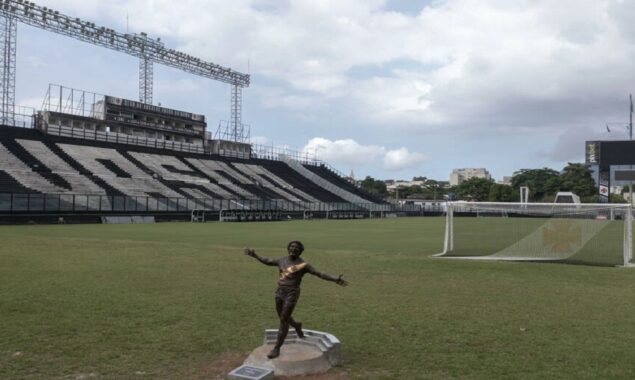
Following in the footsteps of Europe, a new rule permitting Brazilian football clubs to operate as corporations has opened the door for foreign investors to buy teams in the spiritual birthplace of the “beautiful game.”
The regulation, which was passed last year, could help struggling Brazilian clubs turn their fortunes around.
Brazilian clubs have begun to restructure their business strategies after Congress passed the “Football, Inc.” bill last August, encouraging the formation of SAFs, or “football corporations,” after a century of operating as non-profit organizations.
US investors have already agreed to buy Botafogo and Vasco da Gama, two famous Rio de Janeiro clubs.
Great Brazilian footballer Ronaldo, who has retired from his European Ballon d’Or-winning glory days, has purchased Cruzeiro, the club where he made his professional debut and has added it to his investment portfolio with Real Valladolid of Spain’s second division.
Only two top-tier Brazilian clubs operated as firms prior to the law’s passage: Cuiaba, which is owned by local tyre maker Drebor, and Red Bull Bragantino, which is part of the Austrian beverage company’s international stable of teams.
“Brazilian football was always very closed to external investment because of the domestic-controlled business model,” said Cesar Grafietti, who advises football investors as a partner at consulting firm Convocados.
“With these investments, the trend will be for Brazilian clubs’ management to improve, which brings yet more money and in turn better performance,” he told AFP.
‘Win to be profitable’
Brazilian clubs, according to experts, are an appealing alternative for foreign investors.
Brazil is the world’s top exporter of footballers, and the coronavirus outbreak has undermined its currency.
According to Grafietti, the 213 million-strong country’s business potential is “enormous.”
Botafogo, Vasco, and Cruzeiro were all in financial difficulties before becoming club-companies, which is an all-too-common occurrence for Brazilian clubs.
The findings will now be watched by both fans and investors.
Botafogo made a successful comeback to the top level this season, finishing fourth in the league. Both Vasco and Cruzeiro are fighting for promotion from the second tier.
According to consultancy firm Sports Value, the three clubs had accumulated debts totaling $442 million by 2020.
Botafogo was purchased by John Textor, a US billionaire and virtual reality pioneer who bought a 90% ownership in the club in March.
Textor, who already owns Crystal Palace in England and Molenbeek in Belgium, will invest $77 million on the squad over the next three years as part of the agreement.
“Football is no different than any other business. You have to win to be profitable,” the 56-year-old magnate told CNN in March, before recruiting Portuguese coach Luis Castro and signing a dozen new players.
Ronaldo bought a 90-percent stake in Cruzeiro for an undisclosed amount in April.
“We won’t rest until we’ve broadly implemented a management model that’s efficient, ethical and brings results,” he said.
However, when it comes to adding new players, the club has kept rather quiet.
In the case of Vasco, 777 Partners, which owns Genoa in Italy and a stake in Sevilla in Spain, is looking to buy a 70% ownership in the club for $135 million.
Vasco’s advisers and partners must yet approve the transaction.
More deals on horizon
According to sports marketing expert Rafael Zanette, this trailblazing trio of clubs had to move quickly due to “urgent financial considerations.”
“In the future, some clubs interested in becoming SAFs will probably be more demanding in negotiations,” he said.
Others, he continued, are paying attention and maybe close behind.
Bahia is reportedly in talks with City Football Group, the owners of Manchester City and nine other clubs, according to local media sources.
Atletico Mineiro, the reigning league champions, have stated that they will not rule out going public.
Flamengo, Corinthians, and Palmeiras, among others, are holding out for the time being.
However, this could change.
Brazil, whose clubs have won four of the last five Copa Libertadores, will continue to dominate South American football under the new format, according to Zanette.
“Latin America should be looking to the Brazilian market as a reference,” he said.
“This is the path to grow, and even start catching up to Europe.”
For the latest Sports News Follow BOL News on Google News. Read more on Latest Sports News on oldsite.bolnews.com
Read More News On
Catch all the Sports News, Breaking News Event and Latest News Updates on The BOL News
Download The BOL News App to get the Daily News Update & Follow us on Google News.




